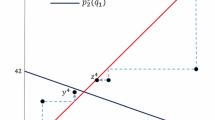Abstract
It is frequently suggested that predictions made by game theory could be improved by considering computational restrictions when modeling agents. Under the supposition that players in a game may desire to balance maximization of payoff with minimization of strategy complexity, Rubinstein and co-authors studied forms of Nash equilibrium where strategies are maximally simplified in that no strategy can be further simplified without sacrificing payoff. Inspired by this line of work, we introduce a notion of equilibrium whereby strategies are also maximally simplified, but with respect to a simplification procedure that is more careful in that a player will not simplify if the simplification incents other players to deviate. We study such equilibria in two-player machine games in which players choose finite automata that succinctly represent strategies for repeated games; in this context, we present techniques for establishing that an outcome is at equilibrium and present results on the structure of equilibria.
Similar content being viewed by others
References
Abreu D, Rubinstein A (1988) The structure of Nash equilibrium in repeated games with finite automata. Econometrica 56(6): 1259–1281
Anderlini L (1990) Some notes on church’s thesis and the theory of games. Theory Decis 29: 19–52
Aumann R (1992) Perspectives on bounded rationality. In: Proceedings of 4th international conference on theoretical aspects of reasoning about knowledge, pp 108–117
Banks J, Sundaram R (1990) Repeated games finite automata and complexity. Games Econ Behav 2: 97–117
Ben-Porath E (1990) The complexity of computing a best response automaton in repeated games with mixed strategies. Games Econ Behav 2: 1–12
Ben-Porath E (1993) Repeated games with finite automata. J Econ Theory 59: 17–32
Ben-Sasson E, Kalai A, Kalai E (2006) An approach to bounded rationality. In: Advances in neural information processing systems, vol 19 (Proc. of NIPS), pp 145–152
Binmore K (1987) Modeling rational players I. Econ Philos 3: 179–214
Binmore K (1988) Modeling rational players II. Econ Philos 4: 9–55
David C (1988) Rationality computability and Nash equilibrium. Econometrica 60(4): 877–888
Fortnow L (2009) Program equilibria and discounted computation time. In: Proceedings of the 12th conference on theoretical aspects of rationality and knowledge, TARK ’09, ACM, New York, pp 128–133
Fortnow L, Santhanam R (2009) Bounding rationality by discounting time. CoRR. abs/0911.3162
Gilboa I (1988) The complexity of computing best response automata in repeated games. J Econ Theory 45: 342–352
Gossner O (1999) Repeated games played by cryptographically sophisticated players. Working paper
Halpern JY, Pass R (2008) Game theory with costly computation. CoRR. abs/0809.0024
Howard JV (1988) Cooperation in the prisoner’s dilemma. Theory Decis 24(3): 203–213
Kalai E (1990) Bounded rationality and strategic complexity in repeated games. In: Game theory and applications. Academic Press, San Diego, pp 131–157
Kalai E, Stanford W (1988) Finite rationality and interpersonal complexity in repeated games. Econometrica 56: 397–410
Megiddo N, Wigderson A (1986) On play by means of computing machines. In: Proceedings of the 1986 conference on theoretical aspects of reasoning about knowledge, pp 259–274
Neyman A (1985) Bounded complexity justifies cooperation in the finitely repeated prisoners’ dilemma. Econ Lett 19: 227–229
Neyman A (1997) Cooperation repetition and automata. In: Hart S, Mas Colell A (eds) Cooperation: game-theoretic approaches. NATO ASI Series F, vol 155. Springer-Verlag, Berlin, pp 233–255
Osborne M, Rubinstein A (1994) A course in game theory. MIT Press, Cambridge
Papadimitriou CH (1992) On players with a bounded number of states. Games Econ Behav 4: 122–131
Papadimitriou CH, Yannakakis M (1994) On complexity as bounded rationality (extended abstract). In: ACM symposium on theory of computing, pp 726–733
Piccione M, Rubinstein A (1993) Finite automata play a repeated extensive game. J Econ Theory 61: 160–168
Rubinstein A (1986) Finite automata play the repeated prisoner’s dilemma. J Econ Theory 38: 83–96
Rubinstein A (1998) Modeling bounded rationality. MIT Press, Cambridge
Simon H (1969) The sciences of the artificial. MIT Press, Cambridge
Spiegler R (2004) Simplicity of beliefs and delay tactics in a concession game. Games Econ Behav 47: 200–220
Spiegler R (2005) Testing threats in repeated games. J Econ Theory 121: 214–235
Tennenholtz M (2004) Program equilibrium. Games Econ Behav 49: 363–373
Author information
Authors and Affiliations
Corresponding author
Rights and permissions
About this article
Cite this article
Chen, H. Bounded rationality, strategy simplification, and equilibrium. Int J Game Theory 42, 593–611 (2013). https://doi.org/10.1007/s00182-011-0293-7
Accepted:
Published:
Issue Date:
DOI: https://doi.org/10.1007/s00182-011-0293-7




